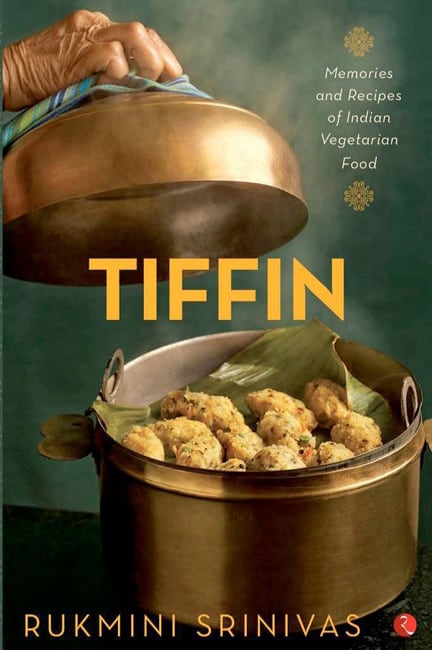CONCEPT: 4/5
WRITING STYLE: 3.5/5
CONTENT:4.5/5
CANDIDNESS: 4/5
ENTERTAINMENT QUOTIENT: 4/5
My Musings
One reason that I never tend to lose weight is that I am a big-time foodie. No matter what, I can never stay away from food for long. Because food and reading are two of my favourite things in the world, I often end up combining them both.
And while I certainly have a penchant for food blogs and recipes, it’s been a while since I picked up a book about food.
Read on to know what I think of Rukmini Srinivas’s Tiffin: Memories and Recipes of Indian Vegetarian Food, a book that I picked up on a whim while browsing on my Kindle.
About the author
Rukmini Srinivas is a television chef, gardener, author and entrepreneur amongst many other things. As a student of human geography, her professional stints include teaching at the Queen Mary’s College in Chennai and later at the Delhi University in Delhi.
Over the years, she has also conducted part-time cooking classes for non-Indians in America. Her teaching interests are strictly restricted to Indian vegetarian cooking. Rukmini currently divides her time between Boston and Bangalore where her daughters live.
What to expect?
Expect a book that is part memoir (anecdotal) and part recipes; where the memories section far exceeds the recipes one, and rightly so.
Expect a book that has no structure or chronology, and is much informal in its layout than one would have imagined.
Expect a book that is a little lengthy and heavy on anecdotes. Expect a book that familiarizes one with the delights of South Indian vegetarian ‘tiffin’.
What is the book essentially about?
The book is essentially a treasure trove of memories and has the ability to perfectly capture the essence of the place and the time that it talks about. Rukmini, who is now an octogenarian, takes us back in time to the India and America of the yesteryears. She talks to us about her food and recipes, while narrating to us precious memories that belong in the said time.
Who can read?
Tiffin: Memories and Recipes of Indian Vegetarian Food would be best suited to readers who enjoy reading books about food and books that are part anecdotal.
People who prefer perfectly structured books would do best to stay away from this one as the format is quite informal and messy. It is quite a lengthy book, so readers who are looking for light reads should be warned too.
How good is the writing style?
The writing style is quite informal and though I had reservations in the initial chapters, as the pages moved along, I realized this is indeed the best way to tell Rukka’s (Rukmini’s) story.
The book is sometimes repetitive but that’s the beauty of it. I love how spontaneous most of it is.
Tiffin is more of a food memoir where Rukmini takes us through the beautiful life that she had lived in India and America and sometimes in the UK as well.
All of her recipes are accompanied by memories, the most interesting of which are the ones that talk about RK Narayan. RK Narayan features in her memories at the time when he was working on his masterpiece, The Guide. And reading about the two of them interacting thrilled the reader in me to no end.
Whether it is her father’s early postings in Karachi, Pakistan, her adventures as a young girl in Poona (now Pune) or her horrendous food experience aboard a European ship, every single memory is vividly captured.
Her stories are amusing and grandmotherly, and they manage to create a sense of nostalgia and longing for a time that one may have never seen.
What did I like?
The best part of the book was undoubtedly the memories, the stories, the treasure trove of anecdotes that accompany the recipes of the book.
While the recipes have been termed ‘simple’, I refuse to acknowledge them as anywhere near that. Most of them are quite fancy and I am sure their taste will justify the effort and planning required in cooking them. But for me, it was the stories that made this book special.
What could have been better?
The book comes with its own share of illustrations and pictures but I would have liked it better if they were more in number. Not every recipe had pictures and that was a major disappointment for me.
Is the book entertaining?
Yes, of course. It loses pace sometimes and gets repetitive but, in the end, it proves to be a worthy read.
In the end
In the end, it is a wholesome book that is a perfect combination of memories and recipes, history and nostalgia.
The final verdict
Go for it!
Pick the book if
- You enjoy books that are about food.
- You love reading memoirs and anecdotes.
- You are looking for a decent read on South Indian vegetarian cooking.
- You enjoy books that are informal and have a grandmotherly feel to them.
- You like reading books about the 1950s, 1960s and 1970s and crave for a sense of nostalgia when you read them.
Skip the book if
- You are looking for a proper cookbook.
- You don’t like books that are poorly structured or are repetitive.
- You don’t like lengthy reads.
- You don’t like slow reads.
Can’t wait to read it? Buy your copy of Tiffin: Memories and Recipes of Indian Vegetarian Food using the link below.
